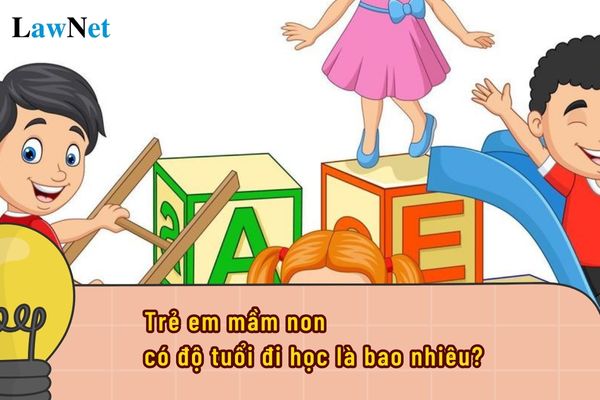What is the age for children to start preschool school in Vietnam?
What is the age for children to start preschool school in Vietnam?
According to Article 26 of the Education Law 2019 regarding preschool education institutions:
Preschool Education Institutions
Preschool education institutions include:
1. Nurseries and independent nursery groups accepting children from 03 months to 03 years old;
2. Kindergartens and independent kindergarten classes accepting children from 03 years to 06 years old;
3. Preschools and independent preschool classes are education institutions combining nurseries and kindergartens, accepting children from 03 months to 06 years old.
The age of preschool children is also stipulated in Article 32 of the Preschool Charter issued together with Circular 52/2020/TT-BGDDT as follows:
Age and Health of Preschool Children
1. Children from 03 months to 06 years old are admitted to preschools.
2. Disabled children are admitted at an older age compared to the general rule of 03 years.
Thus, preschool children have a school age from 03 months to 06 years old.
Note: Disabled children are admitted at an older age compared to the general rule of 03 years.

What is the age for children to start preschool school in Vietnam? (Image from Internet)
What are rights and duties of preschool children when attending school in Vietnam?
When studying at school, preschool children have rights and duties stipulated in Articles 33 and 34 of the Preschool Charter issued together with Circular 52/2020/TT-BGDDT as follows:
* Regarding the rights of preschool children, there are [7] rights as follows:
- To be nurtured, cared for, and educated in accordance with their commuting conditions and the school's reception capacity.
- To be nurtured, cared for, and educated according to the preschool education program suitable to the child's abilities and needs.
- Disabled children are entitled to inclusive education and enjoy educational policies for people with disabilities as stipulated.
- To be assured of physical and mental safety; to be cared for, respected, and treated equally; to be assured of legitimate rights and interests; to be assured of material conditions, hygiene, and safety at the preschool.
- To participate in activities that enhance individual abilities.
- To enjoy policies as stipulated.
- To enjoy other rights as stipulated by law.
* Regarding the duties of preschool children, there are [5] duties as follows:
- To be polite to grandparents, parents, teachers, and adults; to unite, love, and help friends and younger children.
- To actively and positively participate in nutrition, care, and education activities for children appropriate to their abilities and age.
- To wear neat and age-appropriate clothes convenient for activities at the preschool.
- To maintain personal hygiene; to participate in maintaining the hygiene of the school and classrooms within their capabilities, and to contribute to environmental protection.
- To comply with the regulations of the preschool.
Are preschool children in Vietnam eligible for health checks at the beginning of the academic year?
According to Article 9 of Joint Circular 13/2016/TTLT-BYT-BGDDT, the school is responsible for organizing health management, protection, and care activities for preschool children studying at the school as follows:
- To conduct health checks at the beginning of the school year to assess nutrition and health status: measuring height, weight for children under 36 months old; measuring height, weight, blood pressure, pulse, and vision for students from 36 months old and above.
- To measure height, weight, record growth charts, and monitor physical development for children under 24 months old monthly and for children from 24 months to 6 years old quarterly; to monitor body mass index (BMI) at least twice a school year to provide counseling on proper nutrition and physical activity for school children.
- To regularly monitor students’ health, detect vision impairments, spinal deformities, dental diseases, mental health disorders, and other illnesses for timely handling, referral to health facilities for examination and treatment according to regulations, and apply appropriate study and training policies suitable to health conditions.
- To coordinate with qualified health facilities to organize specialized examinations and treatment for students.
- To provide first aid and emergency care according to current regulations of the Ministry of Health.
- To advise students, teachers, parents, or guardians of students on issues related to diseases, physical and mental development of students; to guide students in self-care for their health; in the case of schools with disabled students, to provide counseling and support for their integration.
- To guide organizing meals at school ensuring reasonable nutrition, diverse foods, suitable for the target groups and ages in schools with boarding or semi-boarding students.
- To coordinate with local health facilities in organizing vaccination campaigns and disease prevention for students.
- To inform periodically at least once a school year and as necessary about students' health status to parents or guardians. School health staff evaluates students' health status at the end of each education level to serve as a basis for health tracking in subsequent levels.
- To establish and record in the medical records, health monitoring books for students, and consolidated health status reports.
- To regularly check and supervise learning conditions, school hygiene, food safety, provision of drinking water, and handwashing soap. To proactively implement hygiene measures and policies to prevent epidemics as stipulated in Circular 46/2010/TT-BYT and other health agency guidelines.
- To organize the implementation of health programs, disease prevention campaigns, enhancement of physical activities, reasonable nutrition, building a smoke-free environment, and the non-use of alcoholic beverages and addictive substances.
Thus, in accordance with the above regulations, preschool children will undergo health checks at the beginning of the school year to assess their nutritional and health status.

